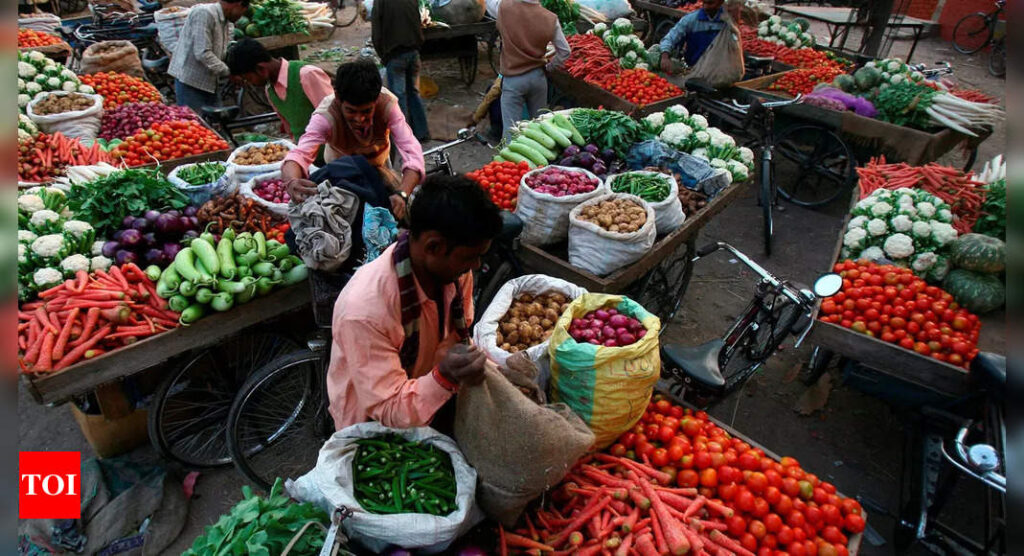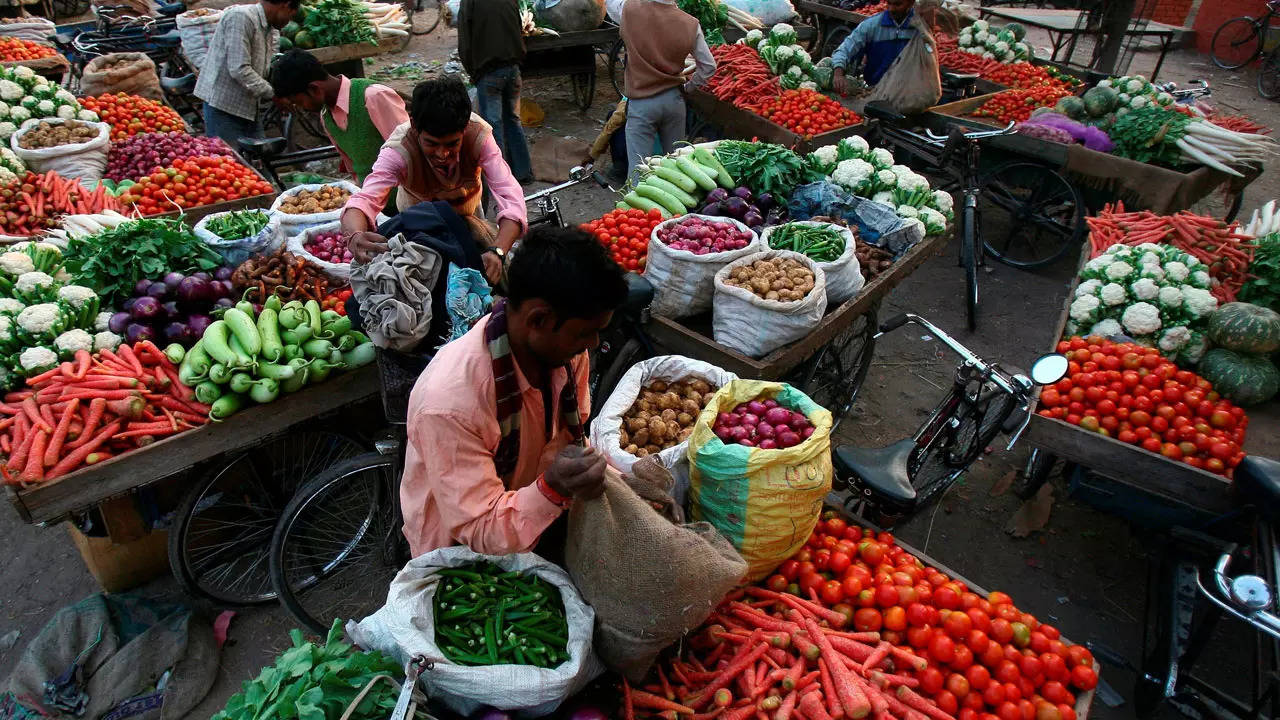Retail inflation in June rises to three-month high of 4.81% – Times of India

The inflation in June is at a three-month high, mainly on account of hardening prices of food, according to the government data.
It was in February 2023 when the Consumer Price Index (CPI) based inflation was logged above the RBI’s comfort zone of under 6%.
The government has tasked the central bank to ensure retail inflation remains at 4 per cent with a margin of 2 per cent on either side. The central bank mainly factors in the CPI to arrive at its bi-monthly monetary policy decision. The next policy review is scheduled early next month.
Inflation for the food basket was at 4.49 per cent in June, higher than 2.96 per cent in May. The food basket accounts for nearly half of the CPI.
Last month, the Reserve Bank kept policy rates unchanged at 6.5 per cent and projected retail inflation for the current fiscal to average at 5.1 per cent, with June quarter inflation pegged at 4.6 per cent.
Meanwhile, India’s industrial production rose 5.2 per cent in May, according to the official data released on Wednesday.
Factory output measured in terms of the Index of Industrial Production (IIP) grew 19.7 per cent in May 2022.
Expert view
Saugata Bhattacharya, executive BVP and chief economist, Axis Bank, Mumbai
“More than the slightly higher-than-expected headline CPI inflation, it is the sticky core inflation print which is likely to worry the Monetary Policy Committee (MPC) at the forthcoming policy review.”
“An extended pause is the likely response for monetary policy, but unless core inflation shows signs of falling over the next few months, the chances of a rate cut in early 2024 are receding.”
Madhavi Arora, lead economist, Emkay Global, Mumbai
“The sharp sequential uptick in food-led inflation could spill over until August, implying the pressure on headline print will stay. There isn’t much the Reserve Bank of India can do in food supply management but this adds pressure on them to stay vigilant on domestic dynamics. Global externalities have already pressed them to signal a wait-and-watch guidance and the transient food spike will only complicate their reaction function.”
Devendra Pant, chief economist, India Ratings & research, Gurugram
“(The) jump in June 2023 retail inflation was on expected lines. However, it was higher than the expectations. Unlike May 2023, there was no base effect and it remained lower than the upper tolerance limit of the RBI.”
“The worrying part … is the reversal of three months of declining trend in cereals prices. The delayed onset of the monsoon could be one of the reasons for this. Inflation is likely to trend towards the 5% mark in July 2023 and will be closely watched by the MPC (Monetary Policy Committee). We don’t expect any monetary easing in the coming monetary policy.”
Sachchidanand Shukla, group chief economist, L&T, Mumbai
“The June print signals a return of food inflation woes for the central bank. Prices of cereals, key vegetables, especially tomatoes and pulses registered a rise on both sequential and annual basis.”
“This in conjunction with erratic rainfall, and the El Nino threat will lead to a recalibration of market expectations to the RBI staying higher for longer. US CPI and yields will also weigh on the outlook for rates.”
Radhika Rao, senior economist, DBS Bank, Singapore
“The impact of adverse weather conditions is likely to keep food inflation buoyant in July-September based on past cycles and magnifying the seasonal pick up usually witnessed during this period. Strong inflation prints are aligned with the central bank’s cautious stance on price pressures, which prompted them to maintain a hawkish stance and is likely to delay expectations of policy easing.”
Aditi Nayar, chief economist, ICRA, Gurugram
“The spike in vegetable prices is set to push the CPI inflation to an uncomfortable 5.3%-5.5% in July 2023. We expect the vegetable price shock to result in the Q2 CPI inflation exceeding the MPC’s last forecast of 5.2%. Accordingly, we anticipate that the MPC will retain its hawkish tone in August 2023, keep the repo rate unchanged and signal that a pivot to rate cuts remains distant.”
Anjali Verma, chief economist and co-head research, Phillipcapital India, Mumbai
“CPI is on expected lines, the uptick being led by a rise in food inflation, while core CPI remained unchanged at 5.2%. While some elevated vegetable prices may correct in the coming weeks, food inflation is expected to remain seasonally high. Food-led rise in CPI should not have much bearing on RBI’s policy stance unless it leaves a permanent dent.”
Sakshi Gupta, principal economist, HDFC Bank, Gurugram
“Inflation risks have risen over the last month with weather-related disturbances leading to an increase in prices of certain vegetables, pulses as well as cereals. Moreover, the sowing progress of major kharif crops has been lagging (-8% y-o-y) due to the uneven distribution of monsoons so far.”
“As the high base effect from last year fades away in Q2 FY24 and food prices rise, the next inflation reading is expected to print above 5%. The RBI will keep rates tight at 6.5% for the time being and rate cut expectations will be pushed forward if the upward pressure on inflation increases in the coming months.”
Upasna Bhardwaj, chief economist, Kotak Mahindra Bank, Mumbai
“The higher-than-expected inflation has been led by vegetables, pulses and protein-rich items. Weather-related disruptions are expected to keep prices of perishable food items elevated in the near term.”
“Continued disruptions may pose a 20-25 bps upside to our average FY24 estimate of 5.1%. The Reserve Bank of India will remain cautious on these supply side shocks but we maintain our expectations of a pause on rates through the year.”
Suvodeep Rakshit, senior economist, Kotak Institutional Equities, Mumbai
“This trend in vegetable prices has continued in July too. Core inflation was broadly unchanged at 5.1% but will likely moderate over the next few months. Overall, we see upside risks to CPI inflation over the next few months as monsoon-related risks on food prices play out. The RBI will remain cautious and we continue to expect the RBI to remain on an extended pause as it watches for the domestic growth-inflation mix and global monetary policy decisions.”
Garima Kapoor, economist, institutional equities, Elara Capital, Mumbai
“We expect the monetary policy committee to see through the short-term spike in food inflation and remain on prolonged pause. Impending fuel price cuts and global commodity deflation led by weak growth in China will likely help to balance the spike in food inflation in the near term.”
(With inputs from Reuters, PTI)









